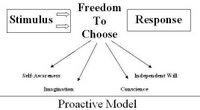As a society, we all seem to want to blame someone else for the position we are in rather than take responsibility for our own actions and decisions; everyone is whining and crying about everyone else. The younger generations of Americans seem to want to place blame for the failures in our life anywhere but with our selves. This mentality of not wanting to accept responsibility for a given situation is so prevalent in our society that it seems to be engrained into our psyche on some deep level. We are so conditioned with this that it seems nearly impossible to view things any other way. Our society is in great need of a basic paradigm shift where this principal of responsibility is concerned.
(Note: the following contains excerpts from the book "The Seven Habits Of Highly Effective People" by Stephen Covey)
Blame is simply a manifestation of ignorance.
Some of us place the blame with our parents, we say that somehow they imposed some abnormal emotional state, or that they somehow failed to provide us the faculties we need to be successful and productive members of society. Many also blame the government for our position, believing they should do more to help us in our circumstances; that the government somehow is to blame for our lack of ability to fit in society. Each group is similar in that we each look outward for blame when we should be looking inward for responsibility.
To accept responsibility for yourself and your actions is to reach true independence and self-reliance.
It is simply a matter of immaturity and dependence. Dependence is the idea of you, you take care of me; you come through for me; you did not come through; I blame you for the results. Independence is the idea of I, I can do it; I am responsible; I am self-reliant; I can choose. True independence of character empowers us to act, rather than be acted upon. It frees us from circumstances and other people. Dependent people, you see, need others to get what they want, independent people, however, can get what they want through their own effort.
We live presently through our previous actions.
Every single situation we are ever involved with is a direct result of a decision we have made. This is the dictum by which we should all live our life. No matter what the circumstance or how unlucky things seem, we can always trace this very moment directly back to some decision we have made at some point in our life, past or present. Every choice we make has a cause, even if we decide not to choose we still have made a choice.
Reactive vs. proactive.
For each individual situation, there is a typical emotion and a typical action that accompanies it. Though not always logical, it is the conditioned response taught to us through some combination of factors. Our responses may be typical, but they are not mandatory. We can always choose our actions, or reactions.
There are, basically, three theories of determinism widely accepted to explain the nature of man:
Genetic determinism says our grandparents made us this way. It is in our DNA, it just goes through the generations, and we inherited it. For example, we might say that is why we have such a temper; our grandparents had short tempers and it is in our DNA. Furthermore, we might say that we are Irish and that is the nature of Irish people.
Psychic determinism says our parents made us this way. Our upbringing, our childhood experience essentially laid out our personal tendencies and our character structure. Our parents brought us up this way. It is the way we were taught to be as a child and therefore engrained into our psyche. For example, we may feel terribly guilty when we make a mistake because we remember, subconsciously, the emotional scripting when we were very vulnerable, tender, and dependent. We remember the emotional punishment, the rejection, the comparison with somebody else when we did not perform as expected. This, also, is the basis of Freudian psychology, which postulates that whatever happens to us as children shapes our character and personality and basically governs our whole life. The limits and parameters of our life are set, and, basically, we can’t do much about it.
Environmental determinism says our boss is making us this way, or our spouse, or that bratty teenager, or our economic situation, or national policies. Someone or something in our environment is responsible for our situation. It is the outside world acting upon us and influencing our character now as adults.
Each of these is based on Pavlov’s stimulus/response theory. The basic idea is that we are conditioned to respond in a particular way to a given stimulus. This is called reactivity. I contend, however, that while we cannot always choose our emotions, we can choose our attitude and we can choose our actions. We do not have to be reactive. If something angers us, we can choose not to lash out in revenge. If something saddens us, we can choose not to act mournful or sorrowful. If something elates us, we can choose not to celebrate in the face of others. We can always choose our action and we are, therefore, always responsible for our actions.

As human beings we have free will, the ability to act based on our self-awareness, free of all other influence. Self-awareness is the ability to think about the thoughts we are having and includes imagination, the ability to create scenarios in our mind beyond our present reality; and conscience, a deep inner awareness of right and wrong, the principals that govern our behavior, and a sense of the degree to which our thoughts and actions are in harmony with them. Free will, and therefore self-awareness, gives us the ability to choose our thoughts independently of outside influence. That means that between stimulus and response we have the freedom to choose. In any particular situation, we can choose not to respond in the way we have been conditioned. This is called proactivity. Now I know that recently proactive has been the buzz word for the self help gurus but it means more than taking initiative, it means that as human beings we are responsible for our own lives and that we can subordinate feelings to values.
 Choose your attitude; it may be your only choice.
Choose your attitude; it may be your only choice.
Our choices always precede those of the people around us. While it is true that most situations and circumstances rely, at least partly, on outside influences, factors outside of our control, we are always in control of ourselves. We are in control of how we react to those factors, we are in control of the decisions we make, and based on those decisions, we are in control of how we act. At times, it may seem as though someone else’s actions are the cause of our misfortune or circumstance. However, if we look more closely at the situation, we find that prior to their actions, a choice that we made or an action we chose brought us directly to the position we are in; so you see that while someone else’s actions may be a factor in our situation, our actions brought us to theirs.
I am my own person and I control everything that I do.
Everyone needs to understand that our behavior is a product of our decisions, not our conditions. Look at the word responsibility- “response-ability” –the ability to choose your response. Proactive people recognize that responsibility, we do not blame circumstances, conditions, or conditioning for our behavior; our behavior is a product of our own conscious choice, based on values, rather than a product of our conditions. Proactive people accept responsibility for the decisions we make and the actions we take. Humans are proactive by nature, so if our lives are a function of conditioning and conditions, it is because we have, by conscious decision or by default, chosen to empower those things to control us.
We should be asking our self which of these best describes us, reactive or proactive; which one would we like to be?
Reactive people are often affected by their physical and social environment, good weather and good treatment makes them feel well while bad weather and bad treatment makes them feel defensive or protective and affects their attitude and performance. Reactive people are driven by feelings, by circumstance, by conditions, and by their environment. Proactive people, on the other hand, are driven by values. Proactive people are still influenced by external stimuli, whether physical, social, or psychological; but our response to the stimuli is a value-based choice of response. Once we accept responsibility for our self, we have the choice to be either.
I am where I am today because of the choices I made yesterday.
If we all just realized that the lives we live are the sum of the choices we have made, we could effectively shape our lives by making choices congruent with our individual set of values. However, instead, we would rather point fingers and place blame than to take responsibility for our actions, our decisions, and our own lives.






